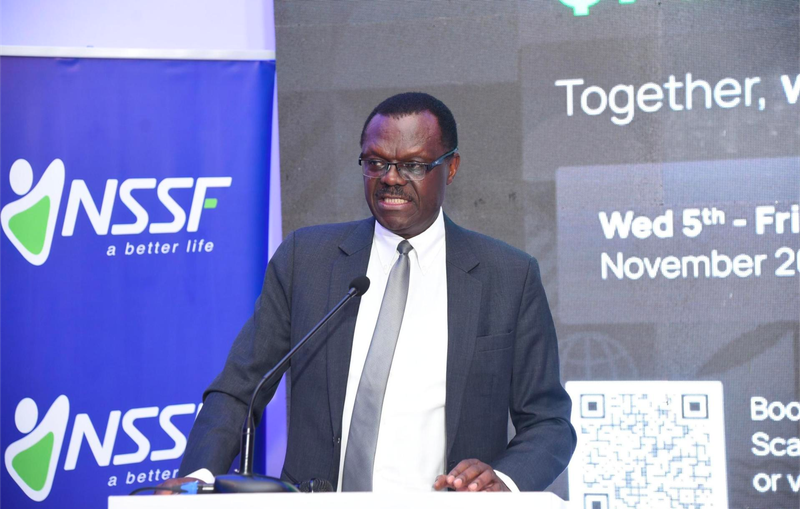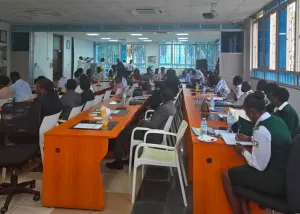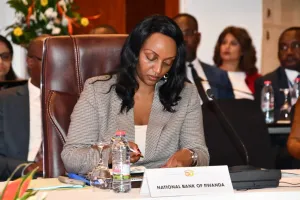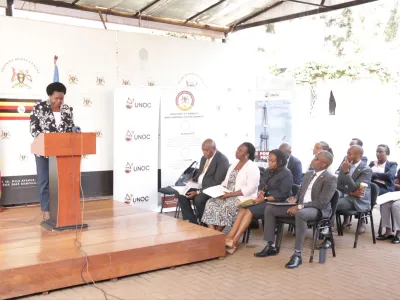
Top executives from Africa’s pension sector are expected in Uganda early next month for the All Africa Pension Summit, a major continental event aimed at unlocking the potential of pension funds to drive job creation, infrastructure financing, and sustainable economic growth across Africa.
The three-day summit, scheduled for November 5–7, 2025, will be hosted by Uganda’s National Social Security Fund (NSSF) in Kampala. It will bring together chief executives of African pension funds, policy makers, and development finance institutions to explore collective strategies for increasing pension coverage and financing large-scale development projects.
NSSF Managing Director Patrick Ayota emphasized the summit’s significance during a press briefing in Kampala. “We have a major opportunity as pension funds to catalyze our own economies by doing things we have not been doing before. The global geopolitics is now changing, there is uncertainty. The money that we used to get from outside countries is drying up. And it is time as Africans step in,” said Ayota.
Ayota highlighted that the summit will offer a platform for CEOs to explore collaborative investment opportunities. “It is time that Africa takes responsibility for funding its own development,” he said. “Global aid is shrinking, and we can no longer rely on others to pay for our ambitions. We must pool our savings and invest in our own future.”
He noted that African pension funds collectively control assets valued between $700 billion and $1 trillion, but much of this capital remains locked in low-risk instruments like government securities. “If every pension fund on the continent committed just one percent to a shared investment pool, that would raise about $7–10 billion, enough to build five Kampala–Jinja expressways,” Ayota stated, referencing NSSF’s ongoing investment in the highway project.
United Nations Resident Coordinator in Uganda, Leonard Zulu, welcomed the timing of the summit, pointing to Africa’s untapped financial potential. “Africa is not poor. We have over $1.3 trillion in pension funds, nearly $500 billion in domestic revenue, and $427 billion in private savings,” Zulu said. “The problem is not lack of money, but how we use it.”
Zulu commended NSSF Uganda for creating a platform aligned with the UN’s Sustainable Development Goals and Africa’s Agenda 2063, both of which emphasize self-reliance and inclusive growth. He also warned about the decline in international aid: “We must move from aid to trade, and from dependence to resilience,” he said, noting that 15 of Africa’s 20 major development partners have cut their aid budgets.
Uganda’s Fourth National Development Plan (2025–2030) outlines ambitions to expand the economy from $61 billion to $500 billion by 2040. Zulu stressed that achieving this will require mobilizing more domestic capital beyond taxation. “Uganda’s pension sector alone is worth 25.4 trillion shillings, up 19% from last year. That’s capital waiting to be unlocked for inclusive growth,” he said, adding that alternative sources such as diaspora remittances and financial tools like infrastructure and green bonds must be explored.
Meshack Bandawe, Secretary General of the Africa Social Security Association (ASSA), emphasized the urgency of addressing Africa’s massive infrastructure gap. “Governments and donors cannot meet this demand alone,” he said. “We must use our own savings to close the gap.”
ASSA, which unites pension and social security institutions from 15 African countries, is developing an African Infrastructure Investment Fund. The goal is to pool pension assets to finance essential infrastructure projects across energy, transport, agriculture, and water. “Our aim is to invest in high-impact areas that improve people’s lives,” Bandawe said, applauding NSSF Uganda for fostering regional collaboration and helping remove policy and regulatory roadblocks.
He also cited Asia’s success in using domestic capital for national development: “Countries like South Korea and Singapore became global success stories by using their domestic savings to build industries. Africa can do the same. We already have the financial muscle, it’s time to use it.”
Private sector interest in partnering with pension funds is also growing. Amanda Kabagambe, Chairperson of the East Africa Venture Capital and Private Equity Association (EAVCA), said there is readiness among investors to direct local capital toward transformative projects. “Much of Africa’s wealth is tied up in land, livestock, or idle savings,” she said. “This summit is about turning that wealth into capital that builds businesses, creates jobs, and transforms economies.”
She stressed the importance of policy support: “Local capital must lead local development,” Kabagambe said. “We shouldn’t send our entrepreneurs abroad to look for investors when the capital is here.” She noted that EAVCA has been pushing for tax incentives and policies that support homegrown private equity and venture capital funds.
Ayota further revealed that NSSF Uganda and other East African pension funds have already set up a regional task force to pursue cross-border investments. “We found there are no legal barriers stopping a Ugandan fund from investing in Kenya or Tanzania,” he said. “What often holds us back are politics and perceptions.”
He reassured NSSF contributors that their savings remain the fund’s top priority. “Our members’ money must be safe and available when needed. That’s why any investment whether in Uganda or abroad must pass strict tests for safety, liquidity, and returns.”
Ayota pointed out that this investment approach has already yielded results. “That’s because we spread our investments wisely across the East African market,” he said, citing a 13.5% interest rate delivered last year as evidence of NSSF’s prudent diversification.
As the continent prepares for the summit, consensus is building around a shift in Africa’s development model, from dependence on aid and foreign loans to mobilizing domestic financial resources. Innovative approaches such as development guarantees and debt-for-development swaps could reduce risks and encourage broader investment participation.
Zulu echoed this need for change: “Many African countries borrow at interest rates of 13% to 18% from international markets because of poor credit ratings,” he said. “But if we use our own savings, we can finance projects at much lower costs, and keep the money circulating within our economies.”













Marlene Luwedde
Leave a Comment
Your email address will not be published.